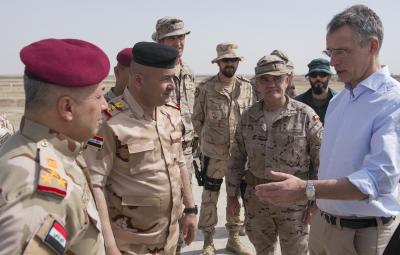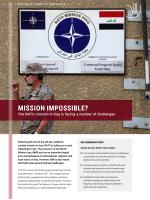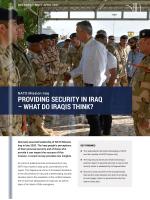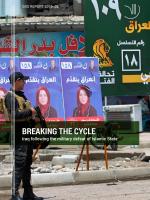Mission Impossible?
Moving forward, NATO could consider:
- Formulating context-specific minimum qualification requirements for advisors and push for one-year deployments as the standard.
- Revising security protocols to facilitate advisory activities and interactions with a broader range of Iraqi counterparts to ensure Iraqi ownership.
- Simplifying bureaucratic procedures by critically evaluating the added value of the frequency and format of reporting related to NMI’s long-term objectives.
In 2019, a wave of protests swept across Iraq, forcing early elections in October 2021. The meagre turnout reflected the population’s limited belief in elections actually bringing about fundamental change. However, the results did upset the balance of power within Iraq’s elite pact, leading to an unprecedented stalemate between two dominant political alliances representing the country’s majority Shiites. The Shia infighting has created a dangerous political and security vacuum that intersects with deep-seated public dissatisfaction with the Iraqi political system. While the public sector in Iraq urgently needs reforms, these are derailed by the prolonged political uncertainty. The security sector, just as all other public sectors, is impacted by the government paralysis. It is in this unstable political environment that the NATO Mission Iraq (NMI) operates.
The NMI was established in 2018 with the aim of preventing the return of Islamic State and the spread of terrorism by strengthening the Iraqi security forces. This is done by providing tactical-level training at Iraqi military education institutions and strategic support to the Iraqi Ministry of Defense. Being a NATO mission is both enabling and challenging. As this brief discusses, NATO policies and internal procedures can inhibit institutional effectiveness while the adopted zero-risk approach to security incidents has implications for advisory activities. Moreover, NMI – and its Iraqi counterparts – must deal with the insecurity of not knowing whether the next government will consist of Iraqi parties with an explicitly antagonistic view towards any Western presence in Iraq. This has not only exacerbated insecurities related to the future of NMI, but also destabilized the already precarious security situation in Baghdad, which directly impacts NMIs freedom of movement.
Prioritizing security
The mission is located in the Green Zone, a heavily-fortified area inside Baghdad that hosts Iraqi government institutions and international diplomatic missions. The NMI compound is surrounded by T-walls, six-ton steel-reinforced, blast-proof wall segments named for their upside-down t-shape, and entry is only possible through fortified checkpoints. These ‘hard’ security measures limit who can – or wants to - enter the compound as personal information must be provided in order to gain access. They also restrict the advisors in their outreach activities. Meetings outside the compound, even in the Green Zone, must be coordinated with force protection as one advisor must be accompanied by a convoy of 3-4 armoured cars, depending on the location of the meeting, each carrying several armed guards. Consequently, the security logistics related to attending meetings outside the compound restrict who the advisors can meet with and how often. The armed guards will carry out a quick sweep of the location before the meeting and remain at the location during the meeting. This can create an atmosphere of mistrust and hinder advisors’ ability to build relations with Iraqi partners, especially those from NGOs. The movement of advisors is further restricted because force protection is not always available, and some activities can be prohibited due to intelligence provided by international partners and the mission’s zero-risk bias.
The security logistics related to attending meetings
outside the camp limit who the advisors can meet with
and how often.
The bureaucratization of the mission
NMI aims to transform the institutional structures of the Iraqi armed forces based on 14 long-term objectives which have been defined in cooperation between NATO and the Iraqi counterparts. However, the demands from NATO headquarters to continuously provide progress reports risk turning types of activities that lend themselves to measurement – such as number of meetings or phone conversations – into the main criteria of success. Advisors also experience the demands for weekly or bi-weekly reporting placed upon them by the NATO system as a bureaucratic burden.
The mission’s ability to achieve its long-term objectives is also impeded by bureaucratic delays in processing requests sent to the NATO HQ. For example, visits by NMI to several military schools around Iraq have resulted in an expectation among the Iraqi schools of forthcoming support, leading to some frustration on their part as the mission was then unable to move forward as it received no response from the Allied Joint Force Command (JFC) in Naples for months. This challenge is further exacerbated by the advisors’ limited access to resources for new activities. This means that the mission has limited available resources when it comes to supporting an advisor wishing to carry out small tangible activities such as workshops, travel, or renting a venue to avoid having to comply with the harsh security measures in the Green Zone. For instance, the preparation and printing of soldier cards, a pocket size guide to the rules of war now given to Iraqi soldiers, was only made possible through a Danish special grant.
Being a NATO mission
The NMI emphasizes that Iraqi ownership is fundamental in fostering the mission’s ability to help the Iraqis build more transparent, inclusive, and effective security institutions. However, the mission risks being caught between the priorities of both individual states and NATO HQ, leaving little space for Iraqi ownership. The multiple agendas can damage the overall legitimacy and capability of the mission. An example of this was the February 2021 announcement by NATO Secretary General Jens Stoltenberg that NMI would grow from 500 to 4,000 personnel which had seemingly not been coordinated with either the NMI leadership or the Iraqi counterpart. This incident was a highly public example of a general need for continuous in-depth matching of expectations, not just between NATO and the Iraqi counterpart, but also between the NMI leadership and NATO decision-makers as well as individual NATO member states.

The effectiveness and legitimacy of the mission hinges on NATO’s ability to formulate a clear and shared vision of the key characteristics of an effective and accountable Iraqi security sector. At the same time, NATO headquarters must be realistic about what is achievable by the mission, including which agendas the Iraqi counterpart is prepared to take ownership over. An example of a NATO priority that most likely will not be achieved is the effort to counter corruption, referred to as “Building integrity”. Whereas the fight against corruption is important and officially supported by the Iraqi leadership, including Prime Minister Mustafa al-Kadhimi, there is a long tradition in Iraq for rhetorically supporting anti-corruption policies while quietly making sure they do not upset existing power structures.
The importance of human resources
It takes time on-the-job to understand the complex political, economic and security context of the mission and to gain the trust of the Iraqi counterpart. The current norm of six-month contracts is often an obstacle to the advisor’s ability to build a rapport with the Iraqi partners and gain deep knowledge of inter-organizational (in)formal structures. The constant in- and outflux of advisors also limits institutional learning within the mission. Yet more than any other factor, the success of NMI depends on the quality of its advisors. NATO describes the perfect advisor as someone with cultural and institutional knowledge and an ability to transfer knowledge in addition to technical expertise. Decades of internationally-supported security sector reforms in Iraq have demonstrated the need for highly qualified advisors and trainers, if the effort is to have any sustainable impact. This is especially relevant as the Iraqi security forces are experienced fighters. Consequently, the recruitment of both civilian and military NATO advisors should be based solely on how their professional and interpersonal qualifications match the needs of the mission at any given time.
Moving forward
NMI faces substantial challenges in Iraq, but its presence acts as an important signal and counterbalance to international, regional, and local actors. The political infighting and the dire economic situation put the political system at risk of collapsing while the Iraqi population is in the process of losing whatever trust it still has in both Iraqi politicians and the international community, making it imperative to remain committed to localized reforms that build the capacity of Iraqi institutions. As the US is winding down its presence in the Middle East and Iraq, NATO, in partnership with likeminded multinational organizations such as the European Union, is uniquely positioned to take on a more independent role. However, ensuring that NMI achieves its full potential requires a constant focus on improving the mission’s ability to meet the expectations of the Iraqi counterparts.
This brief is partly based on the two authors’ visit to and interviews in the NATO Mission Iraq compound, Union III, Baghdad in January 2022.
DIIS Experts







